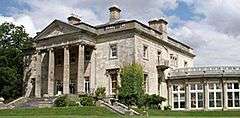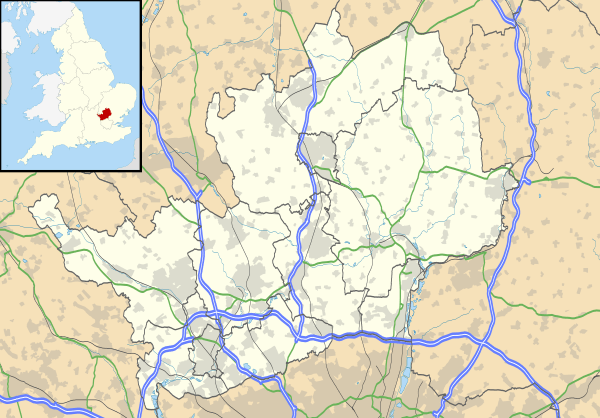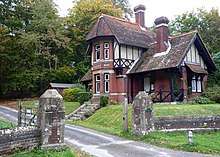Gaddesden Place
Gaddesden Place, near Hemel Hempstead in Hertfordshire, England, was designed by architect James Wyatt and built between 1768 and 1773, and was the home of the noted Hertfordshire Halsey family.
| Gaddesden Place | |
|---|---|
 Gaddesden Place | |
 Location of Gaddesden Place in Hertfordshire | |
| General information | |
| Type | English country house |
| Architectural style | Palladian/Neoclassical |
| Address | Red Lion Lane Great Gaddesden Hemel Hempstead HP2 6EX |
| Town or city | Great Gaddesden |
| Country | United Kingdom |
| Coordinates | 51°47′20″N 00°29′46″W |
| Construction started | 1768 |
| Completed | 1773 |
| Renovated | 1905 |
| Client | Halsey baronets |
| Owner | Charles Moir |
| Design and construction | |
| Architect | James Wyatt |
| Designations | Grade II* listed building[1] |
| Renovating team | |
| Architect | Cole A Adams |
| Website | |
| www | |
The house is set in an elevated position overlooking the Gade Valley and is said to enjoy one of the finest views in the Home Counties.
History
The Halseys moved to Great Gaddesden in 1458 and later became lessees of the Rectory of Gaddesden until March 12, 1545. When King Henry VIII dissolved the monasteries during the Reformation, he granted the estate of King's Langley Priory to William Hawes (or Halsey, also Chambers).[2]
The Halsey family residence was at the Golden Parsonage, a sixteenth-century mansion situated in Gaddesden Row. Thomas Halsey (1731–1788) MP erected a new mansion, Gaddesden Place, to Wyatt's design,[3] about a mile south-west of the Golden Parsonage. In 1774 the family moved to Gaddesden Place, and the Golden Parsonage was partially demolished. In 1788 Thomas Halsey died, leaving the estate to his only surviving daughter, Sarah. She married Joseph Thompson Whately, and he adopted took the Halsey name and coat of arms.[4]
Gaddesden Place was gutted by fire, on the 1 February 1905, and was subsequently rebuilt in 1908 by Cole A Adams. The quadrant links and north and south pavilions were demolished in 1955 and 1963 because of dry rot.[5]
The building was purchased in 1984 by the technology entrepreneur Charles Moir, founder of the software company Computer Concepts, now known as Xara. Since then, Gaddesden Place has been the headquarters of Xara Group Ltd. In 2007, Xara was acquired by the German software company Magix.[6]
Architecture


Gaddesden Place is a Grade II* listed building and is a noted example of Palladian architecture.[1] It is said to be Wyatt's first country work and represents his conformity at the start of his active career to the English Palladian tradition.
It features an entrance surrounded by a 19th-century porte-cochère. On the south side, overlooking the valley, there is a large central portico of five bays (rebuilt 1905) supported by ionic columns. A distinctive semicircular single-storey conservatory, added in 1891, links to an outer wing which has Venetian windows.[7][1]
At the entrance to the grounds on Red Lion Lane there is an 1870 half-timbered brick and Bath stone gatehouse lodge, which is Grade II listed.[5][8]
The landscaped gardens, which feature a pair of Atlas cedars were laid out by Edward Kemp in 1872.[5]
In popular culture
Gaddesden Place and its grounds have been frequently used as film locations.[9] The house was used as the location for Villa Diodati in Ken Russel's 1986 horror film, Gothic, in which Lord Byron (Gabriel Byrne) entertains Mary Shelley (Natasha Richardson) and Percy Bysshe Shelley (Julian Sands).[10]
It has also appeared in the TV series Lewis;[11] in "The Once and Future Ex" episode of Jeeves and Wooster (1993), as Lord Worplesdon's New York residence; and in the Foyle's War episode, "A Lesson in Murder".[12]
Other productions that have shot at Gaddesden Place have included Fanny by Gaslight (1944), A Kiss Before Dying (1991), Little Britain (2000–07), The Legend of Tarzan (2016), The Current War (2018), Slaughterhouse Rulez (2018), and Holby City (s21e01 2019).[9]
References
- Historic England. "GADDESDEN PLACE, Great Gaddesden (1101253)". National Heritage List for England. Retrieved 6 August 2018.
- Burke, Bernard (1906). "Halsey of Gaddesden Place". A genealogical and heraldic history of the landed gentry of Great Britain & Ireland. Harrison. p. 717. ISBN 9785883722270. Retrieved 3 August 2018.
- Evans Sturgill, Thom; Evans Sturgill, Joyce. "Halsey Family History". ThomJoy.us. Retrieved 3 August 2018.
- Page, William, ed. (1908). "Parishes: Great Gaddesden". Victoria County History: A History of the County of Hertford: Volume 2. O. London. pp. 201–207. Archived from the original on 9 August 2018. Retrieved 9 August 2018. (British History Online)
- "Gaddesden Place" (PDF). Hertfordshire Gardens Trust.
- Clarke, Gavin (12 January 2012). "Acorn King Moir: BBC Micros, Ataris and 'BS' marketing". Archived from the original on 9 August 2018. Retrieved 9 August 2018.
- Pevsner, Nikolaus; Cherry, Bridget (2002). Hertfordshire. Yale University Press. p. 152. ISBN 0300096119. Retrieved 3 August 2018.
- Historic England. "THE LODGE, GADDESDEN PLACE, Great Gaddesden (1172970)". National Heritage List for England. Retrieved 6 August 2018.
- "Gaddesden Place". gaddesdenplace.com. Archived from the original on 9 August 2018. Retrieved 9 August 2018.
- Pykett, Derek (2009). British Horror Film Locations. McFarland. p. 61. ISBN 9780786451937. Retrieved 3 August 2018.
- 'Lewis' production notes
- Foyle's War (TV Series 2002–2015) - Filming Locations - IMDb
External links
| Wikimedia Commons has media related to Gaddesden Place. |
- The Gaddesden Place fire of 1905 Great Gaddesden (A Guide to Old Hertfordshire)
- Gaddesden Place and Xara Online
- The Halseys and Gaddesden Place